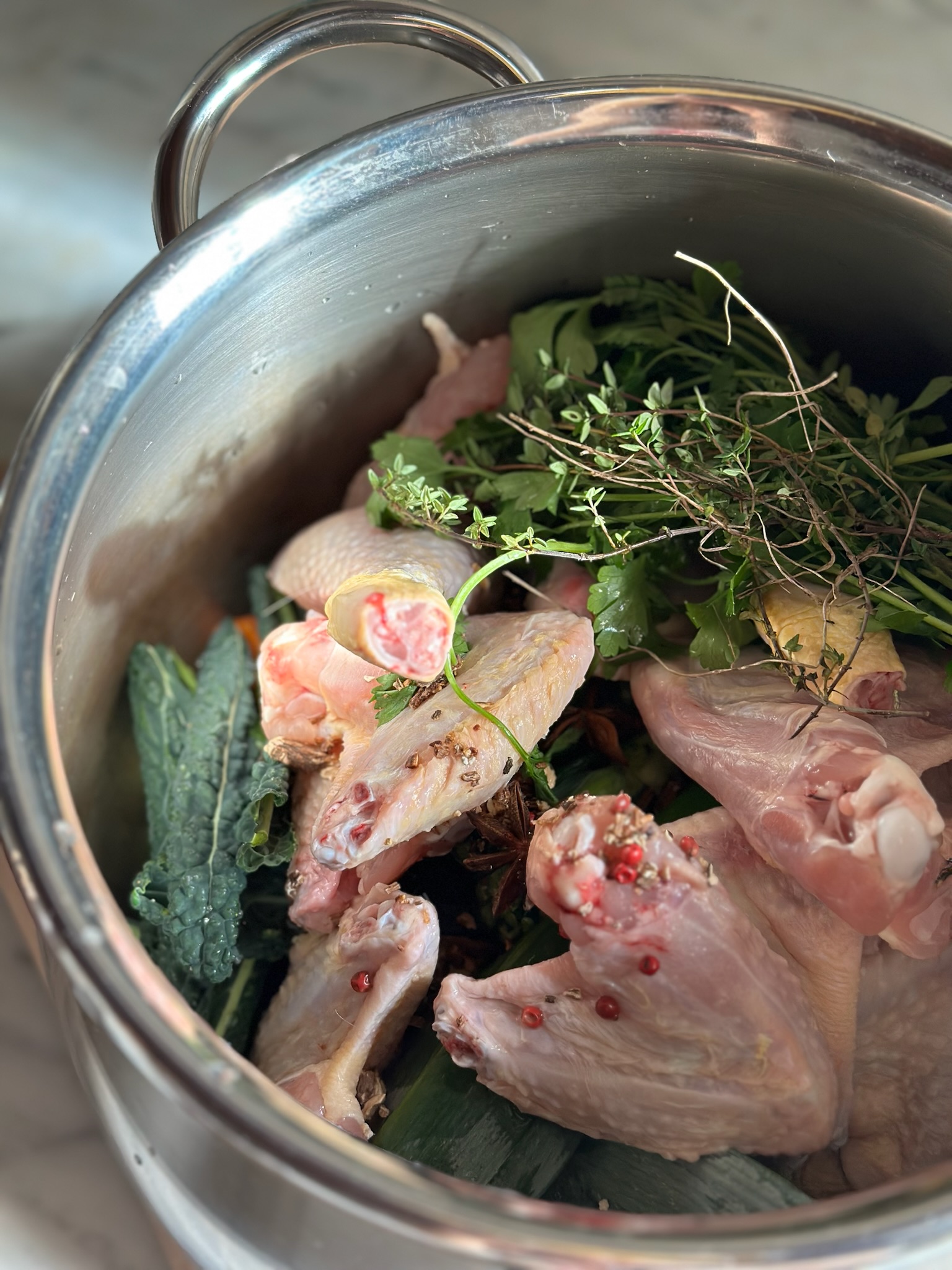Chicken bone broth recipes for Sensitive Stomachs
The aValue of Healthy And Balanced Food: Why Bone Broth Is an Excellent Choice for Infants
When it comes to your baby's nutrition, every option matters. Bone broth sticks out as a nutrient-dense alternative, offering important minerals and vitamins that sustain development and development. Its abundant structure not only aids digestion however also improves the body immune system. Recognizing how to integrate this functional food right into your baby's diet can set the phase for healthy and balanced consuming behaviors. So, what are the very best ways to present bone broth to your youngster?
Nutritional Advantages of Bone Broth for Newborns
When you present bone broth to your baby's diet regimen, you're giving a nutrient-dense food that uses many health advantages. Loaded with crucial vitamins and minerals, bone broth contains calcium, magnesium, and phosphorus, which sustain your infant's expanding bones. It's additionally rich in collagen, aiding in the growth of healthy and balanced skin, joints, and connective tissues.
In addition, bone broth is a superb source of amino acids like glycine and proline, which play a substantial role in total development and muscle growth. These nutrients help advertise a solid body immune system, establishing a solid structure for your infant's health and wellness.
In addition, bone broth is simple to absorb, making it a gentle choice for your youngster. By integrating this wholesome food right into their meals, you're guaranteeing they receive important nutrients needed for their overall health. So, go ahead and make bone broth a staple in your baby's diet regimen!
Exactly How Bone Broth Sustains Food Digestion
Bone broth is packed with important nutrients that can actually profit your child's digestion. It advertises intestine health and assists with nutrient absorption, making it a fantastic enhancement to their diet regimen. By incorporating bone broth, you're establishing the phase for a much healthier digestive system.
Nutrient-Rich Structure
One of one of the most nutrient-rich foods you can present to your baby's diet is bone broth, which is loaded with necessary minerals and amino acids that support healthy digestion. Rich in collagen, bone broth aids strengthen your infant's intestine cellular lining, making it simpler for their body to absorb nutrients. It provides jelly, which helps in breaking down healthy proteins, advertising smoother food digestion. Additionally, the broth consists of important electrolytes like potassium and magnesium, ensuring your infant stays hydrated and balanced. The amino acids, such as glycine and proline, play a crucial duty in repairing tissues and sustaining overall health and wellness (organic bone broth). By including bone broth right into your child's meals, you're giving them a wholesome food that supports their digestion system properly.
Promotes Digestive Tract Health And Wellness
As you present bone broth into your infant's diet regimen, you'll locate it not only nurtures however also advertises intestine health successfully. Rich in gelatin, bone broth assists soothe the digestive system tract, minimizing swelling and supporting a healthy and balanced digestive tract cellular lining. This is vital for babies, as a balanced intestine setting lays the foundation for overall wellness. Furthermore, the amino acids discovered in bone broth, such as glycine, aid in food digestion and can assist prevent usual belly troubles. By including this nourishing liquid, you're providing your infant with vital nutrients that contribute to a thriving digestion system. Eventually, a healthy and balanced gut can affect everything from immunity to state of mind, making bone broth an excellent choice for your child.
Aids Nutrient Absorption
Presenting bone broth not just sustains digestive tract health yet also plays a considerable function in aiding nutrition absorption. When you offer your baby bone broth, you're giving an abundant source of minerals and amino acids that boost their digestive procedures. The jelly in bone broth assists to relieve the digestive tract lining, improving its capacity to soak up important nutrients. This implies that essential vitamins and minerals from various other foods are more efficiently made use of by your infant's growing body. In addition, bone broth contains collagen, which sustains the development of healthy and balanced cells and body organs. By incorporating this nutrient-dense fluid into your infant's diet regimen, you're ensuring they get the optimum take advantage of their dishes, promoting overall wellness and wellness.
Enhancing the Immune System With Bone Broth

By incorporating bone broth right into your baby's diet regimen, you're supplying an all-natural source of sustenance that promotes health. Think about making bone broth a staple in your infant's meals, as it can play an essential function in their immune health and wellness and growth.
Easy Ways to Incorporate Bone Broth Into Infant's Diet plan
Including bone broth into your baby's diet plan can be simple and fulfilling. You can also use bone broth as a base for soups or stews that you prepare for the household, ensuring your infant gets a taste of scrumptious, healthy and balanced meals.
If your infant enjoys grains, take into consideration cooking rice or quinoa in bone broth instead of water for added sustenance. These approaches will assist your child gain the advantages of bone broth easily!
Homemade vs. Store-Bought Bone Broth: What to Pick
Which is better for your child: homemade or store-bought bone broth? Homemade bone broth supplies you complete control over the components. You can pick high-quality bones, natural veggies, and natural herbs, guaranteeing your infant gets the most nutrients without ingredients or preservatives. And also, making it in the house can be a fulfilling experience, enabling you to bond with your infant while preparing wholesome food.
On the other hand, store-bought options are convenient and save you time. They commonly have preservatives and may not match the deepness of flavor and nutrition you obtain from homemade broth. If you choose store-bought, try to find brand names that are organic and devoid of additives.
Ultimately, if you have the moment and sources, homemade bone broth is more tips here the superior selection for your infant's health. If you're brief in a timely manner, select a quality store-bought choice as a back-up.
Age-Appropriate Bone Broth Serving Suggestions
As your infant grows, it is necessary to customize bone broth offering tips to their developmental stage. For infants around six months, start with a few does of diluted bone broth. Mix that site it with water or bust milk to make it simpler for them to absorb. As they end up being familiar with flavors, you can progressively introduce thicker broth by reducing the dilution.
By the time your little one is around a year old, consider using bone broth as a standalone beverage or blending it right into soups and stews. Just make certain to maintain the broth reduced in salt.
Various Other Healthy Foods to Match With Bone Broth for Infants
When you're looking to improve the dietary value of bone broth for your baby, think about matching it with nutrient-dense veggies like carrots and spinach. Entire grain choices, such as quinoa or wild rice, can likewise add structure and fiber. Furthermore, integrating healthy protein resources like shredded chicken or lentils will round out the meal perfectly.

Nutrient-Dense Vegetables
Nutrient-dense vegetables are a great addition to bone broth for infants, boosting both taste and nourishment. Including veggies like carrots, spinach, and pleasant potatoes can boost the vitamin and mineral content of your broth. Carrots provide beta-carotene for healthy and balanced vision, while spinach is packed with iron and calcium, vital for growth. Wonderful potatoes add all-natural sweet taste and are abundant in fiber, assisting food digestion.
You can quickly blend these veggies into the broth or serve them as soft, prepared pieces along with it. This not just presents new tastes however likewise encourages your kid to take pleasure in a selection of nutrients. By coupling nutrient-dense vegetables with bone broth, you're laying the structure for a healthy diet plan right from the start.
Entire Grain Options

Healthy And Balanced Healthy Protein Resources
Bone broth sets incredibly with various healthy and balanced protein sources, better enhancing your infant's diet regimen. Eggs, when introduced safely, are websites another wonderful selection; they're versatile and packed with nutrients. By integrating these healthy protein sources with bone broth, you're providing your baby a well balanced, nourishing dish that supports their development and development.
Often Asked Questions
Can Bone Broth Cause Sensitive Reactions in Infants?
Yes, bone broth can trigger allergies in infants, particularly if they're sensitive to specific active ingredients. Always consult your pediatrician before presenting new foods and display for any kind of indicators of allergic reactions after feeding.
Just How Should Bone Broth Be Kept for Babies?
You ought to keep bone broth in airtight containers, either in the refrigerator for as much as a week or in the freezer for up to three months. where to get bone broth. Always thaw it properly prior to serving to your baby
Is It Safe to Offer Bone Broth to Premature Infants?
It's important to consult your doctor prior to presenting bone broth to premature babies. They'll analyze your infant's particular health and wellness demands and ensure it's risk-free, considering their distinct nutritional needs and developing phase. Always prioritize professional suggestions.
What Are the Indications of Intolerance to Bone Broth in Infants?
When presenting bone broth, watch for indicators like fussiness, rash, looseness of the bowels, or vomiting. If your child shows any of these responses, it's finest to consult a pediatrician before proceeding to provide it.
Can Bone Broth Be Used as a Meal Replacement for Newborns?
No, you should not use bone broth as a dish substitute for babies. It lacks essential nutrients required for their development. Rather, include it into their diet alongside balanced dishes for added nourishment and flavor.